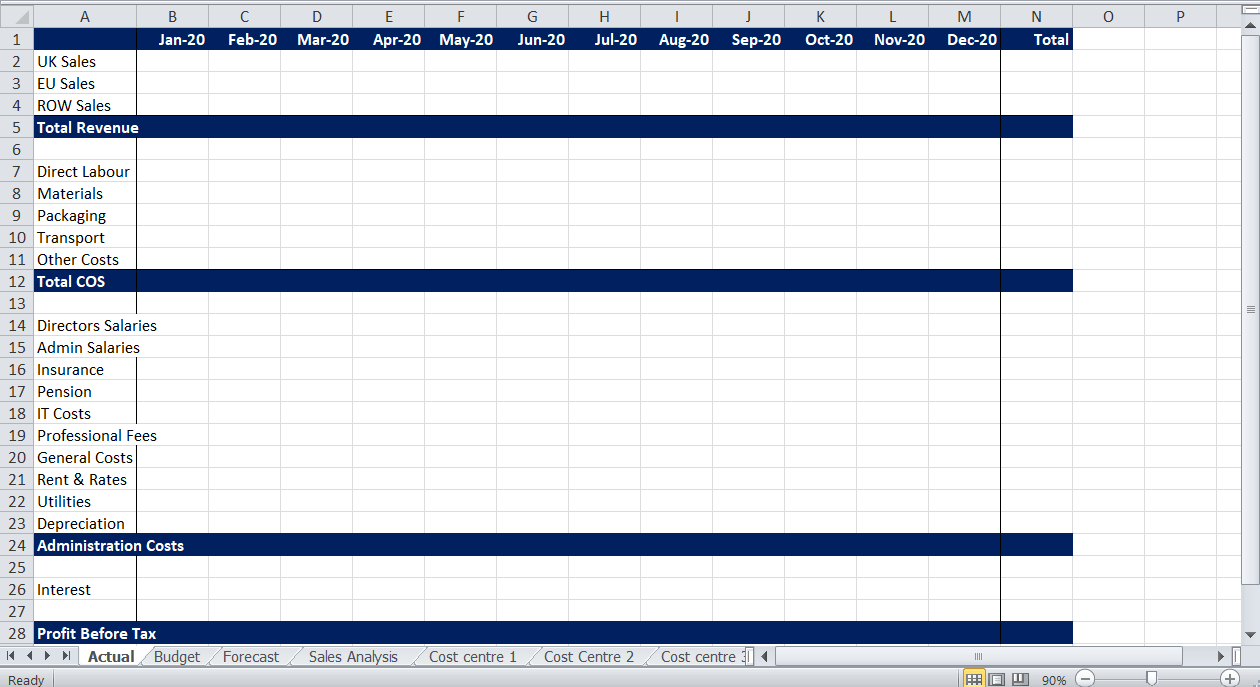The Importance Of Financial Planning In An Uncertain Economy
Cash flow forecasting is crucial to secure the financial health of a business, enabling companies to predict their future cash positions and ensure they have sufficient funds for operations, liabilities, and investments.
Without effective forecasting, businesses risk running out of cash and being unable to meet financial obligations, which will lead to missed opportunities, strained supplier relationships, and potentially, insolvency. Accurate forecasting is a key element of corporate finance planning and can help to avoid these pitfalls and ensure sustainable growth.
So, what steps should you take to enhance your financial planning, particularly during times of economic stress?
Ensure Your Business Budget Is Driver-Based
The first, and most important step in financial planning during times of economic uncertainty is to ensure your budget is based as far as possible on drivers of activity, sales, income, costs, cash flow and capital sufficiency. Rather than a ‘static tool’, this becomes a dynamic model and an invaluable tool that can help you to understand how performance will be affected and key constraints and risks to your business. It helps you to prioritise actions. Knowing exactly how much you have at each stage of your financial journey allows you to effectively allocate resources, ensuring that critical areas of your business are adequately funded. Budgeting is not just about limiting your spending, but making informed choices – deciding what actions are essential and what can wait, especially in managing outcomes during uncertain times.
Build Flexibility Into Your Financial Planning
In uncertain times, flexibility is key. Financial plans should not be set in stone; instead, they should have the capacity to evolve. A flexible planning model, in which re-forecasts and scenarios are easy to run according to the changing business circumstances will help you to align your operations, finances, budgets, and plans with changing circumstances. This provides a clear roadmap; ensuring that your business can react quickly to both opportunities and challenges, staying relevant and viable even as market conditions change.
Invest In Financial Planning Software
Financial planning isn’t just about ‘one set of numbers’ especially in challenging economic times. scenario planning and frequent re-forecasting are essential. This is easier said than done if you are reliant on tools like Excel. The process can be difficult, labour-intensive, slow and prone to error. Everything becomes complicated and leads to higher costs, just at the time you are trying to reduce overheads. Budgeting software and other financial tools can streamline the process. Producing frequent re-forecasts and scenarios helps you ‘understand the future’ and the business to deploy resources in the most effective way, enhancing operational effectiveness improving productivity in key areas, and maximising performance
Safeguard Cashflow And Ensure Capital Sufficiency
In uncertain economies, safeguarding cash flow and ensuring capital sufficiency is even more vital. A good integrated P&L, balance sheet, cash flow and financial sufficiency model is essential. Ideally, the model needs to be ‘dynamic’ in the sense that a change to a single figure automatically flows through the whole model, rather than requiring multiple spreadsheets to be updated or macros run. The model should also report both the short-term and the long-term, so that cash flow, capital constraints, borrowing capacity, capital prioritisation and satisfaction of banking covenants are all clearly reported. Effective financial planning involves staying ahead of the effects of economic uncertainties, cost pressures, market trends, regulatory shifts, technological advances etc. By understanding their potential impact, and devising business strategy accordingly, you are able best to ensure financial resilience and remain competitive and adaptable in a rapidly changing economic landscape.
Prepare For All Eventualities
Finally, business finance planning tools are invaluable for accurate forecasting. By enabling businesses to anticipate future events and plan for all potential scenarios, they enhance their ability to prepare for upcoming challenges and growth opportunities. Whether it's setting aside reserves for tough times, investing in emerging openings, adopting cutting-edge technology, or adjusting strategies to mitigate risks, forecasting and scenario planning are critical components of financial planning and are effective ways to reassure investors and lenders that you’re well-prepared for whatever the future may hold.
Download Our Free Guide
For more information about how to improve the quality and efficiency of your financial planning in uncertain economic times, please download our free guide.
Image Source: Canva
Subscribe to our blog
You May Also Like
These Related Stories

What Is Financial Consolidation Software?

Why It Is Crucial In Difficult Times To Invest In Financial Planning & Analysis Software





